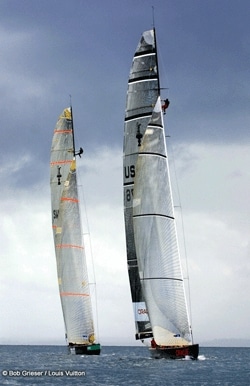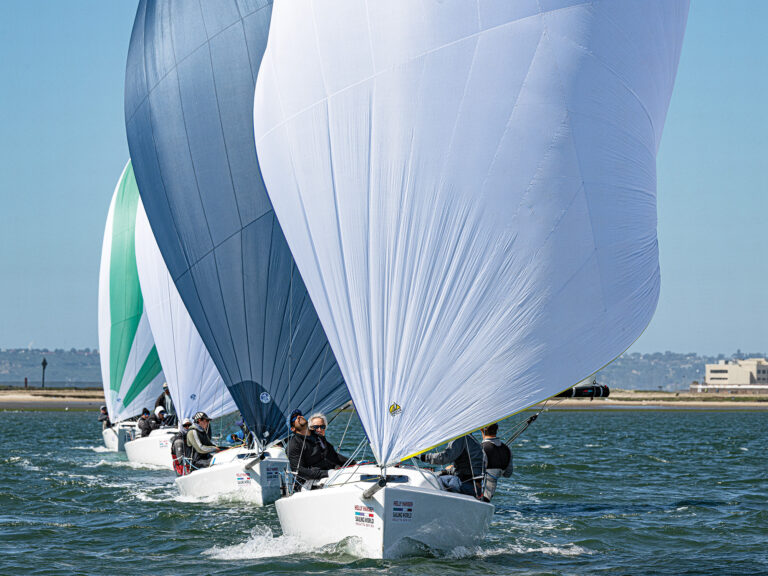
Wednesday, 30th October 2002
Ian Walker — Skipper, GBR Challenge
Francesco de Angelis — Skipper, Prada Challenge
Flavio Favini — Tactician, Mascalzone Latino
**Ian, why are you protesting? On which grounds are you protesting today? **
Ian — GBR submitted a request for redress today. I think anyone out there watching the race would have seen a host of errors by the race committee and we feel that we have grounds for redress emanating from those errors.
**Because of the marks? Or because of what? **
Ian — I don’t want to talk about it. The hearing will be tomorrow. There’s a number of errors ranging from where the course area was, the length of course, as well as procedural errors. Correct me if I’m wrong but it’s probably the first America’s Cup race that’s gone round an island since 1851. We certainly didn’t expect to be sailing round islands and through headlands. Had we known that we probably would have had a different set of charts on board.
Bruno — In the 1930s there were some coastal races.
Ian — I knew you would correct me.
**Do you know when the protest will be heard? **
Ian — I understand the hearing will be tomorrow, after racing.
**What about the race? You missed that big wind shift to the right and it was over. **
Ian — That’s sort of part of our point – it wasn’t much of a race. On the first beat we didn’t tack. Then the next run we pretty much laid down on port. No one could find the mark because there wasn’t one. Then basically we were a long way behind after the first shift. It was a disappointing day for us. Not just the result but we’ve spent a lot of time and effort training and we want to have good racing. Even if we don’t win the races we want to have a good race and learn from racing against our competitors. Sailing against Alinghi is a big day for us. We got a chance to sail against effectively the champions in Russell Coutts and Brad Butterworth and it was disappointing for us to be too far behind at the first mark to really make a race of it.
**Francesco, do you think luck — good luck, bad luck – is part of this game? **
Francesco — I think everything is part of the game. It was a very difficult day as, as Ian said before, the wind was very shifty and also the short course made it even more difficult. It was a very difficult race. Mascalzone sailed well. We had the left and it was good and then there was this huge shift on the right which changed everything. There was only an opportunity on the second beat to play with the big cloud, the wind shifting and so on and then the last run.
**On the last run did you expect to win the race? **
Francesco — We rounded the top mark with the two boats very close. We knew it was a long run with a light wind. We kept pushing.
**Flavio, this was your first day steering Mascalzone. You had a big race, a good race. But you must be extremely frustrated tonight. **
Falavio — Yes, I think we had quite a good race. We were leading all the way round the course. Of course we were racing a very strong team. When you race a strong team you cannot make any mistakes. The first mistake we made round the racecourse, they passed us. Unfortunately it was very close to the finish so there was no time to recover.
**A jibe? A misjibe? **
Flavio — Yes, it was a bad jibe. We had a twist on the spinnaker during the jibe and it was very light air. When you jibe in light air you lose a lot of speed and you need the sail to fill as soon as possible on the new jibe. With the twist it never filled. And so we were very slow and Prada passed us after a short while.
**Is it the first race you steered the boat? **
Flavio — Yes.
**You hadn’t steered the boat before? Not even training? **
Flavio — No, when we were training I used to steer the old Stars & Stripes boat.
**And who started today? You or Paulo? **
Flavio — Paulo did the pre-start. Paulo’s the specialist on that. He did a very good job on the start. Then we swapped and he took my place as tactician. He did a great job tactically because we took the shifts very well.
**Who’s going to steer the boat tomorrow? **
Flavio — We might try this arrangement for the next days.
Ian, how close to the ground did you come in your run down to the bottom mark?
Ian — One of the problems was that we weren’t really sure what was underneath us. That was one of my concerns that we voiced to the race committee. We had some boats in front of us that helped give us some rough grounds as to where we could be. There were some rocks there. I think the shallowest rocks there were 3.4 metres below datum. There was certainly another set that were about 6 halfway between the island that we rounded and the Noises.
Did you have the chart on board?
Ian — We had some information but we didn’t have any charts.
**Would you expect to race in that part of the water? Is it in the race course area or not really? **
Ian — I think that’s the kind of thing we have to leave the jury to decide. But certainly no, we wouldn’t expect to be racing through there. We’ve certainly haven’t carried out much of our training between the islands there — in fact we’d never sailed through there before. As I say, there are other things that affected the race. It was a light air, very shifty race. In those conditions you always think you can get back in the race. The crew sailed well, we were pushing really hard. Even on the last run it wasn’t totally certain whether or not we were going to get the wind and they weren’t. There were lots of things going on out there and we were just trying to make the best of the conditions, and the course as it was laid out in front of us. But it was certainly very frustrating for us to have to sail in that situation.
**Francesco, you sailed with Le Defi yesterday and Mascalzone today. Who do you think will get to the quarter finals? **
Francesco — I don’t have a crystal ball. I think both of them are good teams. As I’ve said many times before, they are never easy races. The race yesterday with the French was not easy, the race today was not. Twice we’ve raced Mascalzone in very light wind, which makes the race even more open and difficult. I think that it’s a hard call there. Both teams are sailing well, both of them. It doesn’t take much for one or both to start getting points.
Francesco, how do you feel about the downwind performance of your boat? Mascalzone seemed to be pulling away from you every time you were going downwind.
Francesco — The first time they gained on us I think that’s because we didn’t have a good hoist. We were a little twirled in the hoist. Probably we could have picked a different sail. So we didn’t have the best sail for the leg and also we weren’t in a good position. I think we were behind the gas and that was pretty painful. I think the boat is going well because after that, in the next run, I don’t think we had any problems speedwise.
Ian, on the first run it appeared that the pair ahead of you – OneWorld and Stars & Stripes, OneWorld especially – sailed quite a distance past the mark. Is that the way you saw it as well?
Ian Yes. The race committee actually came on the radio and asked them if they wanted to abandon their race. Which was novel, Id never heard the race committee ask that before. Funnily enough Stars & Stripes, who were behind at the time, thought that it was a good idea and it was very dangerous where the mark was, down amongst the rocks. OneWorld were ahead at the time and werent quite so keen to have the race abandoned. But when the boats got down there, there actually wasnt a mark. I think it was Peter Gilmour who came on the radio and asked the race committee – said were 200 m from where the mark should be and there isnt one¿The race committee were actually around the corner, on the other side of the island at the time, so they couldnt see whether there was a mark or not. But they came back and said theres no mark, its a boat¿.at which point both boats started beating back up to the boat. They actually had to sail back up to the boat and round the boat. It was quite difficult and the island and the rocks were all within the leylines sailing down there, so it wasnt a situation I think they wanted to be in and nor we. Its probably a good thing that their race ran out of time or else they might have had similar concerns to ourselves.
Flavio, I guess the jibe cost you what would have been a significant win. Do you know what went wrong? Was it how the sail was trimmed? Or how the boat was turned through the jibe?
Flavio — It was maybe a little bit of a mix of things. Probably a little bit of lack of training for me in turning the boat¿it was a very light jibe and after that we jibed several times more and it never happened again. It’s difficult to say for sure. If we had done what Francesco did, the peel and jibe manoeuvre, we could have jibed more easily. But the finish was quite close and so we thought we could have carried on with that sail, which was not exactly the right one for that very light air. So we thought it was easier to do the standard jibe instead of to change spinnakers but it was not. We were wrong.
You did some jibes after the finish?
Flavio — No, we did some jibes to try and get them again. We did normal jibes without any more twists.









